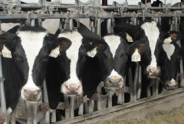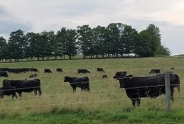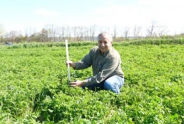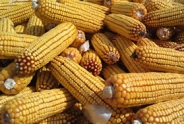Field Nitrogen & GHG: Understanding and Reducing Greenhouse Gas (GHG) Emission in Agriculture & Forestry
Event Details
Date
March 8, 2022
Time
9am - 11am
Location
Zoom
Host
Cornell University
9-10am
ORGANIC NITROGEN MANAGEMENT FOR GREENHOUSE GAS REDUCTION IN AGROECOSYSTEMS: Between a Gentle Seesaw and a Catapult
by Dr. Armen Kemanian
(Professor, Production Systems and Modeling, Department of Plant Sciences at Penn State University)
10-11am
DOCUMENTING and MANAGING FIELD NITROGEN USE FOR GREENHOUSE GAS REDUCTION
by Dr. Quirine Ketterings
(Professor of Nutrient Management in Agricultural Ecosystems at Cornell University).
REGISTRATION is for both the 9am and 10am talks. Log in is the same for one or both talks. Join us when you can! Register here.
RECORDINGS/RESOURCES: These talks will be recorded and posted to our website 7 days after the event. Please visit https://blogs.cornell.edu/workinglands/
Upcoming Events
Swine Production Zoom Series
February 5, 2026
February 19, 2026
March 5, 2026
March 19, 2026
April 2, 2026
Register for the whole series or for one or several sessions.
Announcements
Statewide Field Crop Pathology Needs Assessment Survey
Your input is wanted for identifying priorities!Sign Up for Our Weekly E-Newsletter
We send out a bi-weekly e-newsletter that has announcements, upcoming programs, and opportunities for you! Registration is quick, easy, and free. Click here to sign up today!Farmers Can Join MeatSuite For Free!
MeatSuite.com is a free resource provided by Cornell University where NY meat farmers can create a farm profile and list their bulk (wholes, halves, quarters) and bundled (i.e. Grilling Bundle) meat products.Why should farmers join?
1. It's free and easy!
2. Connect with more local customers. In the past year the MeatSuite.com farm directory had 8,300 visits from New York consumers. Farm profiles get as many as 25 views per month from potential local customers. We also spotlight MeatSuite farms on social media and bring attention and purchases to farms through highlights and giveaways.
How do I join?
Farmers can visit https://www.meatsuite.com/farmers/ to create a free farm profile. You must list at least one product for your farm's profile to go live. You'll also have access to Cornell's free Meat Price Calculator, a helpful tool for pricing your meat to make a profit.
While you're on MeatSuite, check out the "Creating Consumer-Friendly Bulk Meats" publication on the log-in page. It has tips on how to create bulk meat products that are easier for first-time buyers to say "yes" to.
If you have any questions as you create your farm profile or products, we're here to help! Please email Matt LeRoux at mnl28@cornell.edu.





